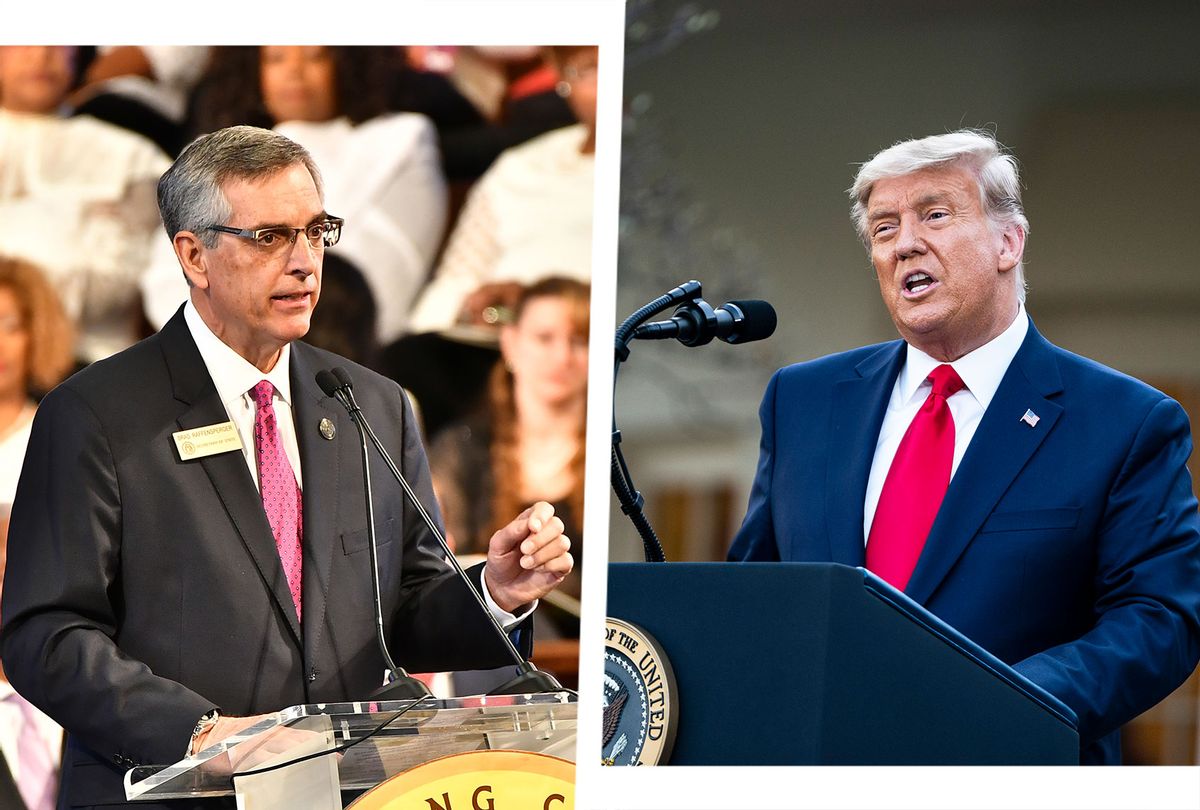On Monday, the state of Georgia opened an investigation into former President Donald Trump's phone call to Secretary of State Brad Raffensperger pressuring him to "find 11,780 votes" to overturn his loss in the state.
The secretary of state's office launched its investigation of Trump's Jan. 2 call one day before Trump's Senate impeachment trial is set to kick off. The investigation comes in response to a complaint filed by George Washington University law professor John Banzhaf, who told Reuters he filed four different election interference complaints following the call.
"The secretary of state's office investigates complaints it receives. The investigations are fact-finding and administrative in nature. Any further legal efforts will be left to the attorney general," Raffensperger spokesman Walter Jones told the Atlanta Journal-Constitution.
Election investigations are referred to the State Election Board, which is chaired by Raffensperger, a Republican. The board can then decide whether to dismiss a case, impose a fine or make a criminal referral to the state's attorney general.
"Any investigation of a statutory violation is a potential criminal investigation depending on the statute involved," David Worley, the lone Democrat on the election board, told The New York Times. "The complaint that was received involved a criminal violation."
Trump adviser Jason Miller disputed that Trump did anything wrong on the call.
"There was nothing improper or untoward about a scheduled call between President Trump, Secretary Raffensperger and lawyers on both sides," he told Reuters. "If Mr. Raffensperger didn't want to receive calls about the election, he shouldn't have run for Secretary of State."
Raffensperger had rejected Trump's first 18 attempts to reach him, a Georgia official told CNN, before ultimately relenting.
"No, I never believed it was appropriate to speak to the president," Raffensperger told ABC News last month. "But he pushed out — I guess he had his staff push us. They wanted to call."
He previously suggested that his office would not investigate the call because of a Trump lawsuit that named him.
The Fulton County district attorney is still considering launching a criminal investigation into the call as well.
The call was one of several Trump made to Republican officials pressuring them to help his effort to overturn the election after courts around the country found no evidence that there was any widespread fraud. Trump also pressured Georgia Gov. Brian Kemp and other state officials, and former Senate Judiciary Committee chairman Lindsey Graham, R-S.C., pressured Raffensperger as well. Trump also tried to call Arizona Gov. Doug Ducey to stop him from certifying the state's results. Even after rioters broke into the Capitol and hunted for lawmakers on Jan. 6, Trump tried to pressure newly-elected Sen. Tommy Tuberville, R-Ala., to object to the counting of electoral votes.
Trump pressured Raffensperger on the call to "find" him enough votes to reverse his narrow loss in the traditionally red state days before the deadly Capitol riot he is charged with inciting.
"I just want to find 11,780 votes, which is one more than we have," Trump told Raffensperger in a recording obtained by The Washington Post. "There's nothing wrong with saying, you know, that you've recalculated," he added.
Raffensperger repeatedly refuted Trump's baseless allegations of fraud in the state's election publicly and during the call.
"The data you have is wrong," he told Trump on the call.
But Trump repeatedly insisted "there's no way I lost Georgia."
"So what are we going to do here, folks?" Trump later added. "I only need 11,000 votes. Fellas, I need 11,000 votes. Give me a break."
Trump on the call also criticized B.J. Pak, the U.S. attorney he appointed in northern Georgia, as a "never Trumper" while grousing about Pak's failure to investigate unfounded allegations of fraud. The call promoted Pak to abruptly resign a few days later, amid pressure from the White House. Michael Horowitz, the Justice Department's inspector general, is reportedly investigating Pak's unscheduled departure.
After the call, former Georgia Secretary of State Cathy Cox told the Atlanta Journal-Constitution the call was "stunningly improper" and and "arguably violated state or federal law."
Democrats have also called for the Georgia Bureau of Investigation and the FBI to investigate the phone call.
The Georgia investigation adds to a growing list of legal issues facing the former president. According to Reuters, Trump currently faces nearly a dozen legal battles, including Manhattan District Attorney Cy Vance's investigation into his business dealings.
Legal experts told Reuters the Georgia call may have violated state laws against "conspiracy to commit election fraud, criminal solicitation to commit election fraud, and intentional interference with performance of election duties."
"If you listen to the call, it sounds like any other call that you might have with an organized crime ring or a drug conspiracy ring or something. And that is that you've got almost code talking about — this is what I need you to do, if you could just help me out here," Michael J. Moore, a former U.S. attorney in Georgia under Barack Obama, told CNN. "So you take note of things, you read the Georgia statue, and I think it amounts up to a request that the secretary come in, do something untoward or illegal to allow the election to be shifted in a way that was different than the will of the voters, and that would be an effort to commit election fraud."
Prosecuting Trump may be more difficult, legal experts said, because criminal laws require a deliberate intent to carry out a crime. Trump's lawyers could simply argue that the then-president genuinely believed the election had been plagued with fraud despite an absence of evidence.
Trump bragged about the call during his speech at the rally that preceded the Capitol riot, which killed five people and injured dozens of police officers.
"People love that conversation because it says what's going on," he said. "These people are crooked."

Shares